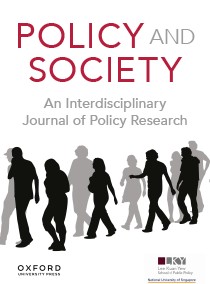2019冠状病毒病、减贫以及加拿大和美国的党派关系
IF 5.7
1区 社会学
Q1 POLITICAL SCIENCE
引用次数: 11
摘要
事实证明,在冠状病毒病(COVID-19)大流行期间,贫困人口特别容易受到经济中断的影响,这凸显了减贫作为一项政策关切的重要性。在本文中,我们探讨了新冠肺炎危机期间加拿大和美国的减贫政治,这两个自由福利国家的减贫是一个关键的政策问题。我们表明,自大流行病开始以来,加拿大和美国都采取了可能大大减少贫困的政策。然而,这种减少贫困的逻辑在两国以不同的方式出现——美国对其政策现状做出了更大的改变。这种情况使我们提出以下问题:在每个国家,制定易于减少贫困的公共政策的政治条件是什么?为了回答这个问题,我们研究了大流行之前和期间的减贫政治,因为我们认为有必要掌握党派和选举模式随时间的演变,以解释大流行期间发生的事情,其影响与其如何与这些模式相互作用密切相关。我们的分析表明,有必要更仔细地考虑危机和党派关系对社会政策的影响,包括减少贫困。本文章由计算机程序翻译,如有差异,请以英文原文为准。
COVID-19, poverty reduction, and partisanship in Canada and the United States
Poor people proved especially vulnerable to economic disruption during the coronavirus disease (COVID-19) pandemic, which highlighted the importance of poverty reduction as a policy concern. In this article, we explore the politics of poverty reduction during the COVID-19 crisis in Canada and the United States, two liberal welfare-state regimes where poverty reduction is a key policy issue. We show that, since the beginning of the pandemic, policies likely to reduce poverty significantly have been adopted in both Canada and the United States. Yet, this poverty reduction logic has emerged in different ways in the two countries—with the United States embracing more significant departures from its policy status quo. This situation leads us to ask the following question: in each country, what are the political conditions under which public policies susceptible of reducing poverty are enacted? To answer this question, we study the politics of poverty reduction both before and during the pandemic, as we suggest that grasping the evolution of partisan and electoral patterns over time is necessary to explain what happened during the pandemic, whose impact is closely related to how it interacts with such patterns. Our analysis suggests the need to consider more carefully the impact of both crises and partisanship on social policy, including poverty reduction.
求助全文
通过发布文献求助,成功后即可免费获取论文全文。
去求助
来源期刊

Policy and Society
Multiple-
CiteScore
18.00
自引率
6.50%
发文量
43
审稿时长
30 weeks
期刊介绍:
Policy and Society is a prominent international open-access journal publishing peer-reviewed research on critical issues in policy theory and practice across local, national, and international levels. The journal seeks to comprehend the origin, functioning, and implications of policies within broader political, social, and economic contexts. It publishes themed issues regularly and, starting in 2023, will also feature non-themed individual submissions.
 求助内容:
求助内容: 应助结果提醒方式:
应助结果提醒方式:


